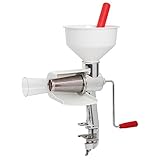Tips for How to Store
Flour to Keep it Fresh
How to Keep Bugs Out
And Freshness In the Flour!
What type of flour storage do you use to keep it fresh?
*FTC Disclosure: As an Amazon Associate I earn from qualifying purchases with no extra cost to you
*FTC Disclosure: As an Amazon Associate I earn from qualifying
purchases with no extra cost to you
I always purchase my flours in large quantities at one time, in an attempt to be frugal.
However, from time to time, I realize that perhaps this is not a good idea, because when I do not bake for a few weeks, I always wonder: "Is my flour still fresh?".
Flour that is not stored properly or allowed to get too old, can go stale or rancid, potentially ruining a recipe.
I have researched the topic of storing flour, and here follow my conclusions, and tips, regarding flour storage.
Be sure to scroll down too, and check out the storage bins for storing large amounts of flour - you know, those BIG bags of flour that are more cost effective to buy, but when you get home you wonder, "how will I store this much flour?".
STORING BASIC FLOURS
Basic flours, (for example: all-purpose flour, cake and pastry flour, and bread flour), are usually more stable for storage than whole grain or alternative flours.
Before grinding, the basic flours are stripped of the bran and the germ, leaving only the endosperm to be processed.
The stripping (and sometimes "bleaching", or "oxidizing") gives the flour its creamy or white colour.
Basic flours can be stored in an air-tight container or a sealed, plastic bag. Label the bag or the container with the type of flour inside, and the expiry date which was shown on the original packaging, and the purchase date.
Keep the bag or container of flour in a room which has a cool temperature, no higher than 75° F.
Basic flours stored this way should keep for up to a few months.
You can also freeze the flour, and bring it to room temperature prior to using it.
STORING WHOLE GRAIN AND ALTERNATIVE FLOURS
Whole grain and alternative flours, (for example: whole wheat, barley, oat and rye), contain more of the grain, starch or nut, and generally this increases the flavour, fat content, colour and the texture of the flour.
These flours tend to be more prone to rancidity, partly because the oil in the grain.
Be sure that the flour storage you are using is proper to maintain freshness.
When purchasing Whole Grain and Alternative Flours it is a good idea to check to see if the packaging has a processing date before purchasing the flour, since these flours do not stay fresh as long as Basic Flours.
Store these flours in an air-tight container or a sealable plastic bag in the freezer.
DO NOT store them at room temperature.
Bring the flour to room temperature before using it.
How can you tell if your flour has gone bad/rancid/has bugs?
You can check to see if your flour has gone bad or rancid, by smelling it.
Rancid flour will have an "off" smell, an indicator that it is not longer suitable for use, and should be discarded and replaced with fresh flour.
Do you purchase LARGE bags of flour at one time?
When I purchase large bags of flour at one time I find it difficult to store once the bag has been opened.
If you use a lot of flour, and are looking for a storage bin which will hold very large amounts, here are several suggestions of great storage ideas, for large and smaller quantities of flour.
These are available for purchase on-line from * Amazon.com.
Click on the images for more product information and product reviews.
TOP of Flour Storage
RETURN to How Tos and Tips
HOME to Homepage
©2010-2025 Raspberry-depot.com - All Rights Reserved Worldwide
No Reproduction Permitted Without
the Express Written Consent of the Site Owner
Special Occasion Recipes
♥ Valentine Recipes ♥
Pancake Day Recipes
Easter Recipes
Mother's Day Recipes
Father's Day Recipes
Thanksgiving Recipes
Christmas Recipes
New Year's Eve Recipes

This Knife Sharpener
is one of the
Most USEFUL
Kitchen
Tools
that I have
EVER
Purchased
I've been using
the same
Knife Sharpener as
the One Below for
Well Over 10 Years!
⇩











